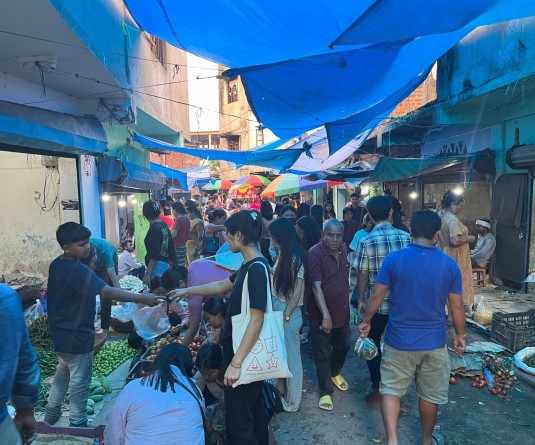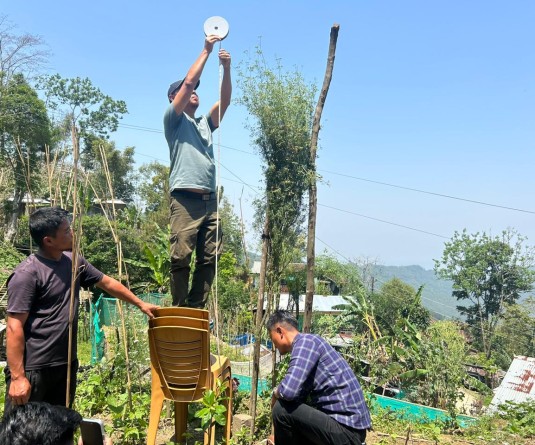
Morung Express News
Zunheboto | May 29
There are a couple of things enchanting about the Hezükhü Memorial District Hospital (HMDH), aka the Zunheboto district civil hospital. It has a well-maintained garden and is located in a serene pocket off Town.
It is otherwise nearly empty. On a day The Morung Express visited the 75-bedded hospital, there were three patients. One of them was a pregnant woman who had to use an Indian-sitting toilet that was raising a stench at the back of the ward. One of the spacious patients’ wards has one CFL bulb in a dim end of the room. When there is no electricity, even this goes off.
But it’s not just patients keeping away from the treacherous roads leading up to the hospital. Even doctors and nurses are scanty, leaving the Zunheboto civil hospital to crumble under lack of care from the Government of Nagaland’s Department of Health and Family Welfare (DoH&FW).
Dearth of nurses & doctors
“There is a dearth of nurses here,” acknowledges a nurse posted at the civil hospital. In what may be a state wide pattern, nurses often get transferred within three years, are “attached” and sent away to other, more convenient, places closer home/cities or just don’t report to their duty station. “The Trained Nurses Association of India in Nagaland had once decided not to encourage the attachment of nurses from one station to the other as this
creates shortfall in rural areas, but this could not be implemented due to political pressure,” notes the nurse. When faced with dire situations, they have no option but to bring in “proxy” trained nurses.
This becomes pertinent particularly at night. Only one nurse, one night attendant and one chowkidar run the show in Zunheboto. Doctors are called in to attend emergency cases, but given the phone network condition in Zunheboto, the efficacy of this system cannot be predicted.
Doctors are similarly under strain. For a hospital that mostly delivers babies, it has no gynaecologist, so a medical specialist handles deliveries along with nurses. Other than that, there is one dental and surgery specialist each at the hospital. There is an anaesthetist too but has not been seen in a while.
“We do 30-40 deliveries per month in this hospital, of which about 10 would be C-section,” says a staff working at the hospital. If and when complications arise, they have no option but to refer the patient to a private hospital in Zunheboto Town.
Making matters worse for financially ailing patients, the hospital provides almost nothing. “No gloves, no medicines, no needles—patients have to buy all this themselves. We also take a small fee from them to keep the hospital running,” inform hospital staff.
Any Government gains legitimacy by providing not just free healthcare to all citizens but also a robust maternal healthcare mechanism.
At HMDH, quite the opposite happens. Since 2014, mothers delivering at this hospital have not been given their incentives under central schemes like Janani Suraksha Yojana.
Intentional neglect
“I haven’t met the Medical Superintendent (MS) for a long time now,” says a doctor at the Hospital. This is one of the reasons that a semi-functional X-ray machine at the HMDH cannot be used, also due to lack of technicians, there is no money to run a 25KVA generator (except during operations) on its premise and central government schemes meant for maternal health fail.
This attitude of neglect is confirmed when The Morung Express visited the Chief Medical Officer’s (CMO) office in Zunheboto Town. It is housed in a former, mouldy, wooden church structure built in 1939, with its unit spread across six buildings of the complex.
Important files and papers—service records, correspondence, appointments, post mortem reports, program files, general establishment files—presumably since 1963, are precariously stacked up on open wooden lofts. Nothing has been digitised and there is no proper infrastructure to protect this critical data that could give a scenario of Zunheboto’s health since the formation of Nagaland State.
From here, the CMO manages programs in 47 sub-centres, 13 Primary Health Centres and two Community Health Centres in Zunheboto district. But the civil hospital has “always been a defaulter.”
Confirming that the HMDH has been erractically managed, the CMO states that he had to take up the responsibility of signing staff salaries since 2015.
“No JSY sanctions have been made to the civil hospital as it has not produced its bank passbook,” informs the Zunheboto CMO.
Generally, an MS handles these duties but sources informed that the previous MS has been transferred and the person who has been appointed now as MS of the HMDH Zunheboto has got a stay order from court on the posting due to the officer’s repeated transfers.
The MS position at the Hospital has been shrouded in murky waters for several years now. The MS name board at the HMDH has not even been updated since 2009. It was informed that the DoH&FW has been well in the know of the situation but has chosen to intentionally neglect it.
“Transfers and promotions are often politically motivated,” says a senior officer of the DoH&FW. “There are many senior doctors who are resigning from the DoH&FW due to unfair play and irrational posting of doctors,” he reiterates as he himself contemplates resignation if not for the “economic condition” of Nagaland State.
In the face of this, the people of Zunheboto have no option but to turn their backs on the government, towards private health care. For the poor, this often means no healthcare at all.




